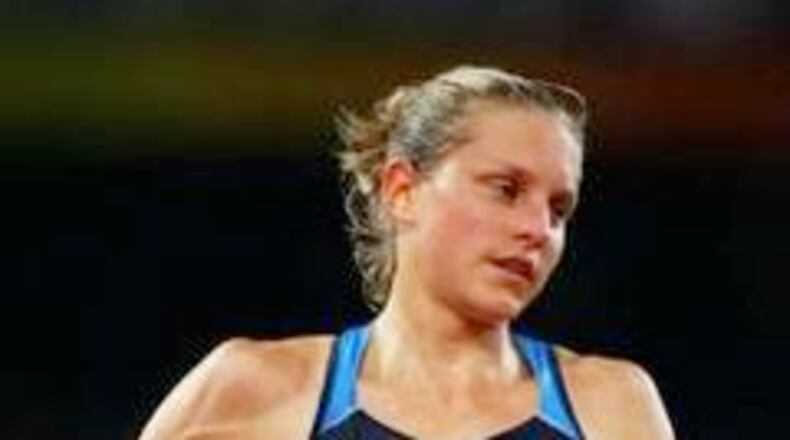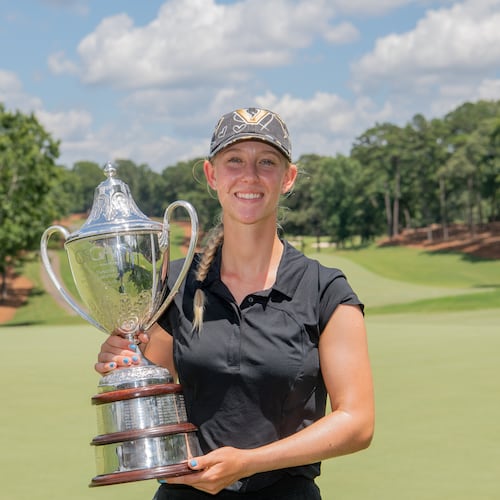Amy Begley and her little red car travelled a circuitous path to end up in Atlanta as the first full-time coach with the Atlanta Track Club.
She and her husband lived in Atlanta in the early 2000s before leaving and taking the “southern route” from Atlanta to Oregon for new challenges. They left there and took the “northern route” to Connecticut for more challenges, before taking the car once again along the “eastern route” from Connecticut back to Atlanta.
She said she laughed earlier this month when she drove by the Atlanta dealership from which she bought the car some 114,000 miles ago.
Begley is skilled at more than just driving long distances. A former Olympic athlete in the 10,000 meters, she is also good at running long distances and coaching others in numerous disciplines, which is one of the reasons that executive director Rich Kenah and the Atlanta Track Club hired her to help each of its 22,000 members accomplish whatever goals they may have, from running a first 5k to competing in the 2020 Olympics.
Begley sat down for a long interview in the club’s offices earlier this month in which she covered everything from why she took the job to how she hopes to help turn the ATC into a full track and field organization. Questions and answers have been edited for brevity and clarity.
Q: How did this come together?
A: There are a lot of different components to the job. But what I loved the most is it’s stuff I’ve done my whole life. I started kids’ camps for cross country and track. I’ve done kids’ speed and track and field days for YMCAs and schools. I started a non-profit for every body type to teach kids about track and field, when they are really little, to try to get them to track and field and maybe not to soccer.
I started a women’s local running club in Portland for women who either wanted to qualify for Boston or run their first 5k or 10k. These are women who had never done a training program before so it was their first time doing that.
I coached the Distance Divas in Oregon and Connecticut, which is a post-collegiate group for kids graduating college and trying to make the next level. I worked with all these different groups, but it’s always been an outreach of my main job, which in Connecticut was as a college coach.
Now all these things I love to do is under one job title. It’s an amazing job to have when everything you love is under one roof.
Q: How do you judge success?
A: That’s hard to do because a lot of people think, “Well she was a fast runner, so she expects everyone to hit a certain level.” Not everybody can win, not everybody can make the Olympic teams. There has to be a level of success for everybody. Sometimes it depends upon time you can spend on it; sometimes it depends upon what your goals are. For some people it’s to qualify for the Boston Marathon. For some people it’s just to literally run their first 5k without walking. So whatever their goal is, if we hit that, then that’s success.
Q: How important was the goal of putting two ATC athletes on the 2020 Olympic team in your considering this job?
A:
Rich’s goal of having a man and woman on the team in 2020, that’s exciting.
But I would say that when I read the job description, that’s only 20-25 percent of my job. The other part of my job is getting kids excited about running, bringing them up from little kids and hopefully they stay around and get on the Atlanta Track Club elite team.
If you do that, if you can get the little kids interested in running, and can get their parents out there, and new people to running, it adds a bigger support system for the elite team that wants to go on.
It really all ties together. My hope is that the Atlanta Track Club elite team will be some of the coaches for the training program; they will be involved so that there will be middle school kids who will watch the TV, and watch NBC and go, “That was my coach!” That gets them excited.
Q: As an Olympic athlete, how difficult of a challenge do you face as a coach trying to get a male and female into the 2020 games?
A: It can be difficult. Every four years we send between 600-700 athletes for all of the sports. That’s not many people for the U.S. That’s just 700 people.
If we can target the right events and the right people and get them to buy in, then anything is possible. There’s some events that I think we might be better at hitting — the 800 meters, 1500 meters, the steeple – right now would be the three that I would push for the most. I definitely think the marathon is another avenue we can pursue.
Q: How hands on will you be as a coach?
A: Right now, we are just going to try to do the distance events, 800 and above. Probably will even look into some 400 meters.
Eventually, toward 2020 we want to have the jumpers and the sprinters and the throwers. We want to be a full track club and not just a distance enclave.
I’m hands on, not only with the Atlanta Track Club elite but with the training programs.
Q: You said there are 200 members on the team. Do you see that number needing to grow significantly to increase the pool of candidates for the Olympics?
A: It depends on funding. Right now we’ve set it at a 200 max with the sponsorship with Mizuno and trying to make sure everybody gets what they need. We don’t want to water it down too much.
Right now, the competitive team as it is won’t change a whole lot in 2015. We will start changing some of the tier systems, but for 2015 it will stay what it has always been.
We will leave spots open for the new kids, the new generation we will bring in, the ones we hope are the 2020 hopefuls.
About the Author
Keep Reading
The Latest
Featured



